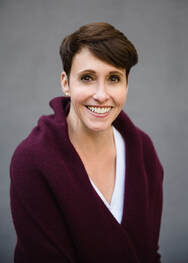
Listen to the episode by clicking the link to your preferred podcast platform below:
Lindsay Lyons : Formerly a High School English teacher and a new teacher coach in Palo Alto Unified School District, Jennifer Abrams is currently a communications consultant and author who works with educators and others, and new teacher and employee support. Being generationally savvy, effective collaboration skills, having hard conversations and creating identity safe workplaces. Jennifer's publications include Having Hard Conversations; The Multigenerational Workplace - Communicate, Collaborate and Create Community; Hard Conversations Unpacked - The Whos, the Whens, and the What - Ifs; and Swimming in the Deep End - Four Foundational Skills for Leading Successful School Initiatives. Her newest book, Stretching Your Learning Edges: Growing (Up) At Work, came out in May 2021. Jennifer has been invited to keynote, facilitate and coach at schools and conferences worldwide, and is honored to have been named one of the eighteen women all K-12 educators should know by Education Week's Finding Common Ground blog. More about Jennifer's work can be found at her website www dot Jennifer Abrams dot com, and on Twitter at Jennifer Abrams.
For reference, 00:01:02 this conversation was recorded on August 16th of 2021. Let's hear from Jennifer. Hi, I'm Lindsay Lyons, and I love helping school communities envision bold possibilities, take brave action to make those dreams a reality and sustain an inclusive, anti-racist culture where all students thrive. I'm a former teacher leader turned instructional coach, educational consultant and leadership scholar. If you're a leader in the education world, whether you're a Principal, Superintendent, instructional coach or a classroom teacher excited about school-wide change like I was, you are a leader. And if you enjoy nerding out about the latest educational books and podcasts, if you're committed to a lifelong journey of learning and growth and being the best version of yourself - you're going to love the Time for Teachership podcast. Let's dive in. Jennifer Abrams, welcome to the Time for Teachership podcast. Jennifer Abrams : Thank you. Glad to be here. Lindsay Lyons : I'm so glad that you're here. 00:02:11 I just read your professional bio, but is there anything else that you want listeners to know as we hear from you today and start the episode? Jennifer Abrams : Oh, I think that I'm trying to be more engaged on Twitter, so I'm at Jennifer Abrams, and please follow me because I follow pretty much everybody that ever follows me. So I'm not one of those... like... I don't know... it's not that I'm not discerning... but I'm very... I want to engage with educators. So, yeah, please follow me on Twitter. Lindsay Lyons : I love that. Thank you. And so one of the first things we usually start with is this idea of big thinking and and knowing that as leaders and as educators, we want to really enact transformative change that advances justice. And I just love how Dr Bettina Love talks about this idea of Freedom Dreaming, she says they're dreams grounded in the critique of injustice. And so I'm wondering, with that in mind - what's the big dream that you hold for the field of education... for the field of leadership? Jennifer Abrams : It's not just my dream, I guess I'm following on Dr Robert Kegan's sort of dream. My big dream for education... and for the educators in the field... is that we actually grow up. And when I say grow up, I don't mean to be cheeky, 00:03:34 although it would... it would sort of sound that way. That we actually believe in our development as adults, as much as we support child development. I don't think we do it enough. So, a big dream for the field is that it is full of awake, conscious, humane educators. Lindsay Lyons : I love that dream. That's amazing. And there's so... so much of a theme, I think with everyone I talked to on this podcast that is dedicated to that dream themselves. They are passionate lifelong learners, they're constantly growing and learning and they see that as just part of their journey. And so I think that's so well connected to so many of the brilliant educators that I've had the privilege of talking to. So I love that. Jennifer Abrams : Good. Lindsay Lyons : One of the things that I think is really challenging for folks is to kind of shift our minds away from how we've always done things, or I mean just thinking about your dream that you shared, I think sometimes there... I've certainly heard educators say things like "I'm the one with the degree," you know, "You need to listen to me." And that kind of thing, 00:04:44 that is very traditional minded, that is very much like "I am the person in charge in the classroom, students obey the authority - end of discussion." you know. Which is is not what we want in education, but certainly exists. And so for people who either have either thought that way themselves, or just working in cultures where they've heard a colleague say that, or they've heard a student come to them saying like, well, this... you know... this teacher is operating in this mindset of "I don't need to grow, I don't need to to learn." What would you tell folks who are kind of grappling with that - so that they can have that mindset shift over to what you're saying? Jennifer Abrams : Okay. So, I was looking at the State of California's standards for the teaching profession... and I live in California... and here the public schools, at least, focus on the CSTPs - the California Standards. And one of those standards is developing as a professional. Now, it doesn't say 'go to professional development,' okay? 00:05:52 Which is great in and of itself. The idea that you go and you learn a little bit about assessment or instruction, or management, or culturally responsive pedagogy, or English learner strategies - there's nothing wrong with any of those things, okay? And the standard says 'developing as a professional.' Which includes something beyond the content. It includes something about yourself developing in a professional way for the profession. And what does that take at this point? That, to me, given your... and mine... I agree with you... that strong stance of fighting against injustice... It requires a different type of developing. And it isn't an 'add on' and it isn't a 'nice to have.' My colleague, 00:06:58 (Unintelligible) would say "Human development is not an indulgence," okay? It is a must have. When you look at today's society... I was thinking just today... and getting a little depressed... that the Taliban, as of today, on this episode, is now taking over the country of Afghanistan, much more authoritarian regime. Haiti has been rocked by an earthquake. There's a tropical storm coming to Florida. There are people defying science all over our country and not wearing masks, and not getting vaccinations. And the world requires that we be a little more developed, I think, to recognize our interconnectedness, to recognize, sort of, the potential that that humans have. And I think that starts with the adults in schools being as developed as we can inside ourselves. 00:08:01 And so I get that yes, you do have a credential and yes, you do have a PhD and yes, you are very capable in certain parts of your job - there's a never ending study about being a humane human being. And working on that will actually serve our profession and should be a part, I will assert, of the expectations we have for our colleagues. So, I don't know if that's going to convince anybody, but I believe it. Lindsay Lyons : Yeah, definitely. And I think it's really heartening to hear, too. As someone who used to exist in a culture where teachers that I would co-teach with would say things like that, or be resistant to that kind of development, I think it's really heartening to hear if someone is like... there's... I don't believe that this is the way right? Like I believe that we can learn and we can grow. I think that's really powerful to hear coming from you, and I love that you brought in so many different current events and just things that, like... I think there is a call for educators and this is kind of my passion with curriculum to model and to bring into the class their own development in the context of what we are all living in in the world today. 00:09:21 And so I think to have that artificial barrier that sometimes people feel like needs to be present between class and real life and we... we even use language like that, right? Like we're preparing students for when they graduate, like, we're preparing students for this afternoon when they go home and they see this on the news, right?? Jennifer Abrams : Right. That's exactly right. There is, to me... and we were... I was having this conversation this morning... I was up very early to do a training with teacher leaders in an elementary school level, in a group, and they were talking about how they don't... they have a personal persona and a professional persona. And I understand that you might be a little different at home... that's a place where you can kind of let your hair down and all that stuff. But that idea that you're not integrated... that idea that you're not fully aware that the world isn't porous, that you're not a human in your educational role, and that you're not taking in exactly what you said... society... every minute... as you're simply, at the moment in time, the educator in charge of this thing. 00:10:28 God... I mean, I think about... I've been teaching now for over thirty years. And my former students are anesthesiologists and the head of the police force and a former mayor... if we're not preparing them for the real world... I want them to be able to lead me, to help me. I mean, in the end, I'm going to be the elderly person and I want them to be the person that's really taking the helm. And so, to me, I'm not just preparing them for graduation - I'm preparing them to be good human beings in the world. And I have to model being an adult. And I have to a) be the adult, which sometimes we are not in our classes, and b) really share that developing is a lifelong thing, and there is a purpose, and a goal which is so much further outside graduation than... I mean, that, to me, is a piece on their journey. That's it, 00:11:33 I hope that they're constantly going to be developing and not just learning content or a craft, but how to be a better human being. That's what I'm thinking. Lindsay Lyons : Absolutely. And I think there's so many ways to do that, and I think we all bring our own kind of niched hats for, like, what that looks like. So for me, for curriculum wise, I'm thinking, you know, when we create projects, we want to create projects where students actually get to take action on an issue, they get to apply the content of the scale in a meaningful way and they get to be that humane human that you're talking about, that gets to have agency, right, and a bit of control. And so that's just one example, but I know you talk about a lot of, you know, brave actions that people can take within the context of all of the books that you've written. And so I'm curious to know, like, what's maybe a couple of ways that people can do this? Can be that kind of educator. Jennifer Abrams : This is gonna sound awfully strange, I think. Keep sharing that you are learning about how to be that humane human being. Go into situations and ask yourself... Suspend your certainty - 00:12:45 Say "What am I missing?" Say "How could I be wrong?" Say "What do you think?" What's your take on this? Give people... you want to know that they have a voice. You want them to have a voice. You want to hear their voice. So, the way that you ask questions isn't like "Can you answer my question?" it's "What are your thoughts about what's going on here?" That, to me, I think will create a more just society because we are engaging in reciprocity and mutual respect for other people and feeling and sensing the dignity. But there's just... in this last book that I wrote about Stretching Your Learning Edges - Growing (Up) At Work, I also speak about taking responsibility for your language. If you have a concern, can you express it before it becomes a complaint? Can you be responsive and not as reactive? If you have to have a hard conversation, can you shape it so it's humane and growth producing? 00:13:49 If you are confused, can you ask for clarification without yelling at the person? "I don't understand what you're saying." I mean, any of these things, I think, are so... they sound easy... and I see that, you know, we're on Zoom and I can see that you're sort of, you know, laughing or whatever... it's so hard. This stuff is so hard to do. But if you model that for kids and you exhibited that with your colleagues - bravo! You know what I mean? These are... this is where I'm a work in progress with all of that. Lindsay Lyons : Absolutely. And I love what you just named too, because... I'm laughing because I think sometimes we say to students "You need to do these things... you need to engage with curiosity, you need to..." And then one minute in the staff meeting room and you can see that that's not how we engage with one another. And so, I think so much of that is modeling in front of students, but also modeling with colleagues away from students and practicing it, because it is challenging, and many of us work with people who we don't always agree with, and we need to have these conversations with, and we're not having that.. 00:14:59 We encourage students too, and so I think, you know, that's a huge piece... Jennifer Lyons : (Crosstalk) that students do, we expect (Unintelligible). We teach eight year olds to use their words, not their fists, to have with peer mediators on playgrounds, so that we're teaching 'I messages' starting at seven, you know, "When you hurt my feelings, I go..." We don't do that. We go into the parking lot, we gossip, and we "I'm never gonna sit next to her," blah blah blah. And so it's fascinating to me that we are. And I think we're doing this justifiably... understandably... after Covid put us in lockdown and might, again... we have decided that we need to support the well-being of everybody. Okay? And that's great. Okay. So we have SEL, we have well-being, we're dealing with trauma sensitive instruction. I think we need to be trauma sensitive SEL focused for the adults. And we talk a lot about we need to create positive cultures. 00:16:03 We have a toxic culture in our school or we don't have a... And we don't know how to expect from each other that we grow up. That we develop so that we are in... we are in cognitive, not social, conflict. We can discuss ideas, we do not have to be mean to one another. We can be healthy enough to show up in a staff meeting and not use our drama around everybody... or basically we say 'kick the dog'... you know, when you go home when it was not the dog's fault that you had a bad day. This stuff is pervasive in so many places, and yet we say we're a teacher of record, we're adults, we have a credential, we know better. None of this, like, fluffy, fluffy stuff. We don't need to really emphasize that, and I'm realize... and we have lots to get done. And there's been quote 'learning loss.' And so there's an urgency to all of this, so, "Quick, let's work on the task at hand." 00:17:11 Meanwhile we're verbally paper cutting each other by our language, and we're not focusing on team relationship. And I think that it's not either/or, and it's totally possible to focus on your language and get something done. It's not easy, and so we shirk the responsibility. But you can change your language and have the same sentence - and it doesn't take any longer. Lindsay Lyons : Yeah. So well said. And I'm also thinking, too, about, like, who's... I'm guessing it's everyone... but whose responsibility you see, you know, as... as being... is it, like, I'm working on myself and I can control myself? Is it, kind of, helping as at the department or a grade team level? Is it leader creating space at the PD level? Jennifer Abrams : Yes. My answer. As you are circling into all of these things, I think that we all need to take responsibility and ownership for creating that culture. 00:18:15 I have heard "Well, if the meetings weren't a waste of time, if the leadership was clearer about dah dah dah." And the answer is yes, they should be. Okay? There should be productive meetings that are useful, there should be as clear of a message as you can get around initiatives, all of that. And, if that isn't the case for you, in one particular moment, can you ask for clarity and focused and purposeful ways? Can you express challenges that you're having, without getting reactive? See what I mean? It's like it's both and all the time. Lindsay Lyons : That makes so much sense. And I love the things that you are listing in terms of what you can literally do because I think, again, it could be, you know, a rubric for a discussion for a class, you're evaluating students on this and you can also use it as your own checklist in a conversation you're having with a colleague, with a student or with your family at home, you can always be practicing these things. 00:19:17 Jennifer Abrams : You got it. Preaching to the choir. Lindsay Lyons : And so I'm wondering... I know you've written so many books... I'm wondering if there is a book that we haven't touched on as we start to, you know, close the conversation? Is there something else that feels relevant to the conversation that you want to bring in here? Jennifer Abrams : That I wrote, or that I didn't write? Lindsay Lyons : Either one. Jennifer Abrams : You know, I am... I have this newsletter called Voice Lessons... which somebody at the beginning said, "That sounds like you're gonna teach people to sing," and I'm like, no, it's not about teaching people to sing, it's about, you know, it's about finding your voice and using your voice in more humane ways - and in it I bring out cool resources. So my friend Megan suggested a book which I haven't yet read... so that's why I'm not... I mean it's called Growing Up at Work, which I was like "What? I just wrote a book called Growing (Up) At Work." Okay. But this is another book called Growing Up At Work, and so that's sitting next to... 00:20:19 I'm just going to share the three books that are sitting here... Courtney Martin's Learning in Public where she just wrote about her daughter in a racially divided school - and she's a fabulous writer, and so cool resources. And the last one is Deep in Thought. And it's about, sort of, the values that we're teaching in schools. And so these are all there. And, to me, it's like all of the same - it's about race and class and belonging and inclusion. It's about being an adult, it's about developing your curriculum. It's like... I read pretty extensively across stuff, and I really... actually, as a side note, I really liked... I thought it was lovely, Respect, the Aretha Franklin new movie from... that just came out with Jennifer Hudson - and so I would encourage people to check that out. It's an amazing exploration of development, let's actually say that, she really... she grew... she found her voice and she grew up. 00:21:28 Yeah. Lindsay Lyons : I love that you brought in that example because I've thought, too, about... because I do a lot of curriculum development and unit development... and thinking about how do we teach skills and how do we create more nuance for, like, the heroes that we celebrate in our curriculum? And that is such a profound way to do it. I mean, I recently read the autobiography of Malcolm X, and I was, like, "Wow! What a learner, what a man who was capable of growth and evolution of thought." Like, we don't typically think of that, because we don't know the nuance and the complexity and, like, that, you know, one page of the textbook that we talk about Malcolm X in. But I think people are so complex, right, and what a great way to bring in video or story or autobiography and study people and then use that as, you know, maybe a journal prompt to self reflect as students, as adults teaching, and to have those conversations. I think that's just a wonderful curriculum tip, too, that you shared, Jennifer Abrams : That'd be fun. That would be really fun. I wanna create a... I want to... I want to find a theme, and then I want to design a curriculum for myself around that and just say "What should I watch, what should I listen to?" 00:22:37 "What should... you know, what music, what podcasts, what movies, what...? Yeah, it would be super cool. Super cool, Lindsay Lyons : I love that idea. So, as we kind of are wrapping up, I'd love for you to share what... you know, we've talked about so many things that listeners can do and sometimes I find that in conversation, you know, people are getting all wrapped up and "Oh, there's like a hundred things I could do, and I'm a bit overwhelmed by that." So what is maybe one thing that, as people are closing up the episode, putting away the headphones, and kind of going out into the world - What's something that they could do to live in alignment with some of the stuff that we've been talking about today as maybe a starting point? Jennifer Abrams : If you are a person who is an extrovert, wait two people before you start talking - that's one thing. So, if you're in a group, you're in a breakout room, you're in a team meeting and you are the person who immediately jumps in - don't. If you are somebody who is very much of an advocate for certain things, it's all good, you could share your perspective and then say "What am I missing?" Period. 00:23:52 "What didn't I think of there? What are your thoughts?" And I think people need more acknowledgment of their capabilities and their competence and if you could in very, very, very small way... I'm gonna give you an example... I have a colleague who is so kind and so powerful when he talks to me... or I experience him that way... where I'll say "Oh, I'm going to do a podcast." and he'll go "Lucky listeners. Lucky listeners.". So I will say to you, lucky listeners, that you have this podcast and I'm so grateful that I'm on it. That... do you see how fast that was? And how powerful something like that is? So it doesn't take that long to do all of these things, 00:24:53 it just takes intention. So those are three ideas. Lindsay Lyons : Those are brilliant and I love that they're scaffolded, too, for people who feel like they tend to gravitate to one thing or gravitate away from one thing. I love that, that's so personalized. And so, I know we talked about learning and growth, like, throughout the episode - but one of the things that I think it's fun to ask at the end of each episode is something that you have been learning about lately on your own journey. Could be about anything. Jennifer Abrams : Oh, I am now in a relationship with a boyfriend. I've been in it for a year. And that's unusual for me. I'm never... I'm never home long enough to create anything like that in my life. And we... what I'm learning is we do a check-in every Sunday and I'm learning not only... so the first two questions are interesting, like, "How do you feel about me today? What do you appreciate?" That's great. But the third question is what I'm learning. The question is "Is there anything you feel incomplete about that you'd like to talk about at this time?" 00:26:03 And I used to be super scared that it was gonna be this huge "Why?" "Thank you so much for the question, I've been collecting data for the last seven days and here's how awful you are." Right? I am learning that if I get feedback that stings... in a short burst... that... and it's like one thing... I can still be okay and I'll take it in and it doesn't sting as much and I'm much better. So what I'm learning is how to accept feedback that I could perceive as negative - and how, that, if it comes to me in certain ways, I can really respond in an adult way with it. But it has to be one thing, and then I'll take it really seriously and I don't crumble. So, that's what I'm learning about myself - is that I've got more of a strength than I thought. Lindsay Lyons : That is beautiful. The check-ins are beautiful, the questions are beautiful - but also just that realization is so beautiful. 00:27:04 And I'm just already thinking about all the implications for students and things, right? Like, wow, that's (Crosstalk) Jennifer Abrams : I've got a coach group that said "We're going to actually do that. We're gonna do those three questions," you know. Or even two questions like "What did you appreciate?" And "Is there one thing this week that, as a team, you want to share that you feel incomplete about?" It isn't like that you should feel like crap. It really actually is you feel incomplete... you didn't find your voice around what mattered at the moment. You feel incomplete and you want to share it like you have to apologize. Or you should have done this or it could be on you. It does... and so those... just... And this group... this group of coaches... said "We're going to use that at the end of the week together." I'm kind of excited about it. I'm kind of excited. Lindsay Lyons : That's amazing. Thank you so much for sharing. And then, the very last question is just finally where listeners can learn more about you - connect with you online. I'm sure people are gonna want to get in touch, or follow what you're doing Jennifer Abrams : Okay. So, I'm at Jennifer Abrams dot com. Two 'n's in Jennifer and no H in Abrams, just A B R A M S. And, it's Jennifer Abrams dot com. And I say that only because if you look me up on Google you're going to find a female bodybuilder because she's Jennifer Lynn Abrams. So just make sure, because I'm not that person. I wish I was that strong, but I'm not that person. 00:28:30 And you can find me on Twitter, you can find me on Instagram, you can find me on Facebook. I'm sort of... I try to create lots of avenues to connect with colleagues. So... find me, please. Lindsay Lyons : That's amazing. Jennifer Abrams, thank you so much for being on the podcast today. Jennifer Abrams : Thank you. Lindsay Lyons : Thanks for listening, amazing educators. If you loved this episode you can share it on social media and tag me at Lindsay Beth Lyons or leave a review of the show so leaders like you will be more likely to find it. Until next time, leaders, continue to think big, act brave and be your best self. Links to contact Jennifer:
0 Comments
Leave a Reply. |
Details
For transcripts of episodes (and the option to search for terms in transcripts), click here!
Time for Teachership is now a proud member of the...AuthorLindsay Lyons (she/her) is an educational justice coach who works with teachers and school leaders to inspire educational innovation for racial and gender justice, design curricula grounded in student voice, and build capacity for shared leadership. Lindsay taught in NYC public schools, holds a PhD in Leadership and Change, and is the founder of the educational blog and podcast, Time for Teachership. Archives
May 2024
Categories |
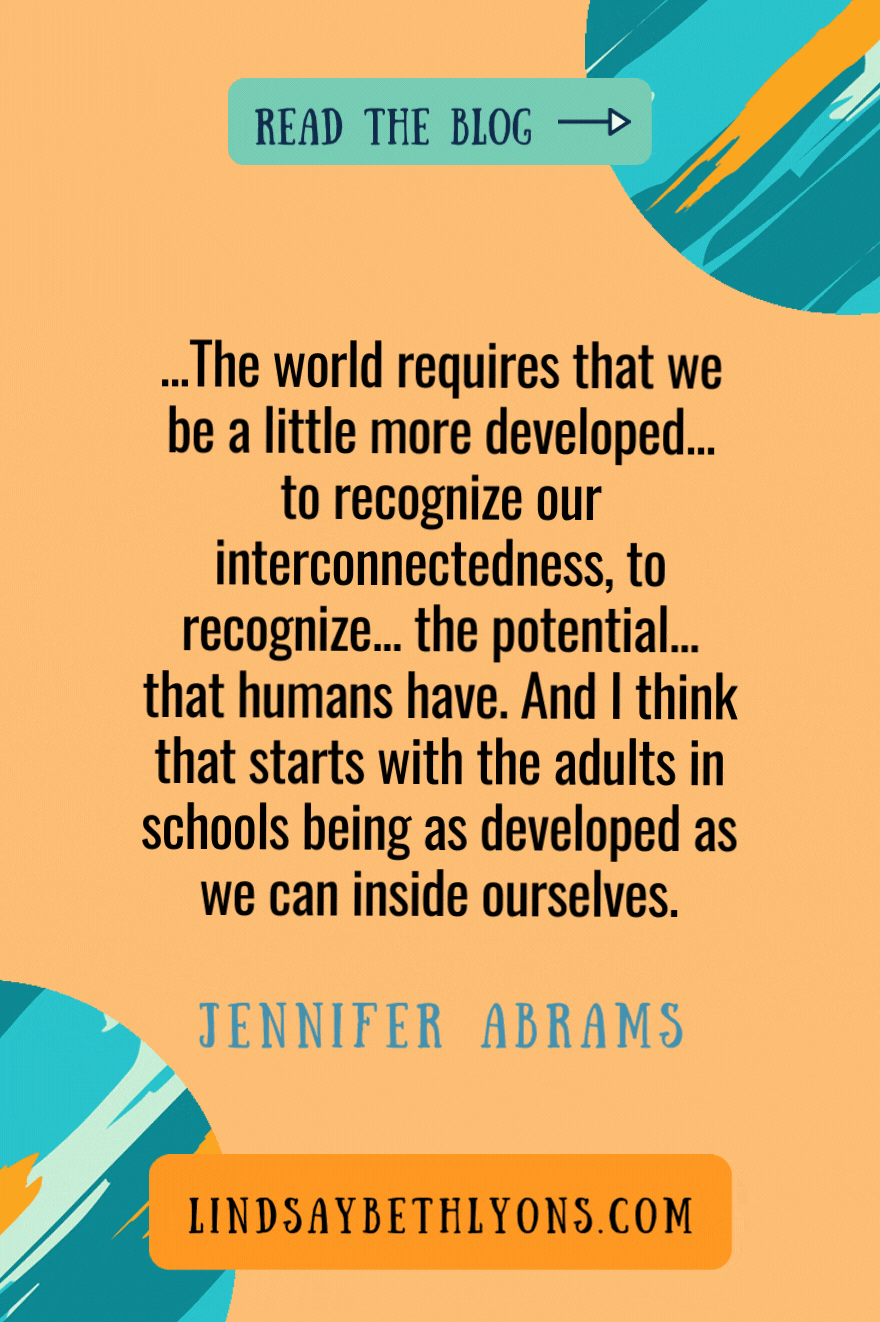
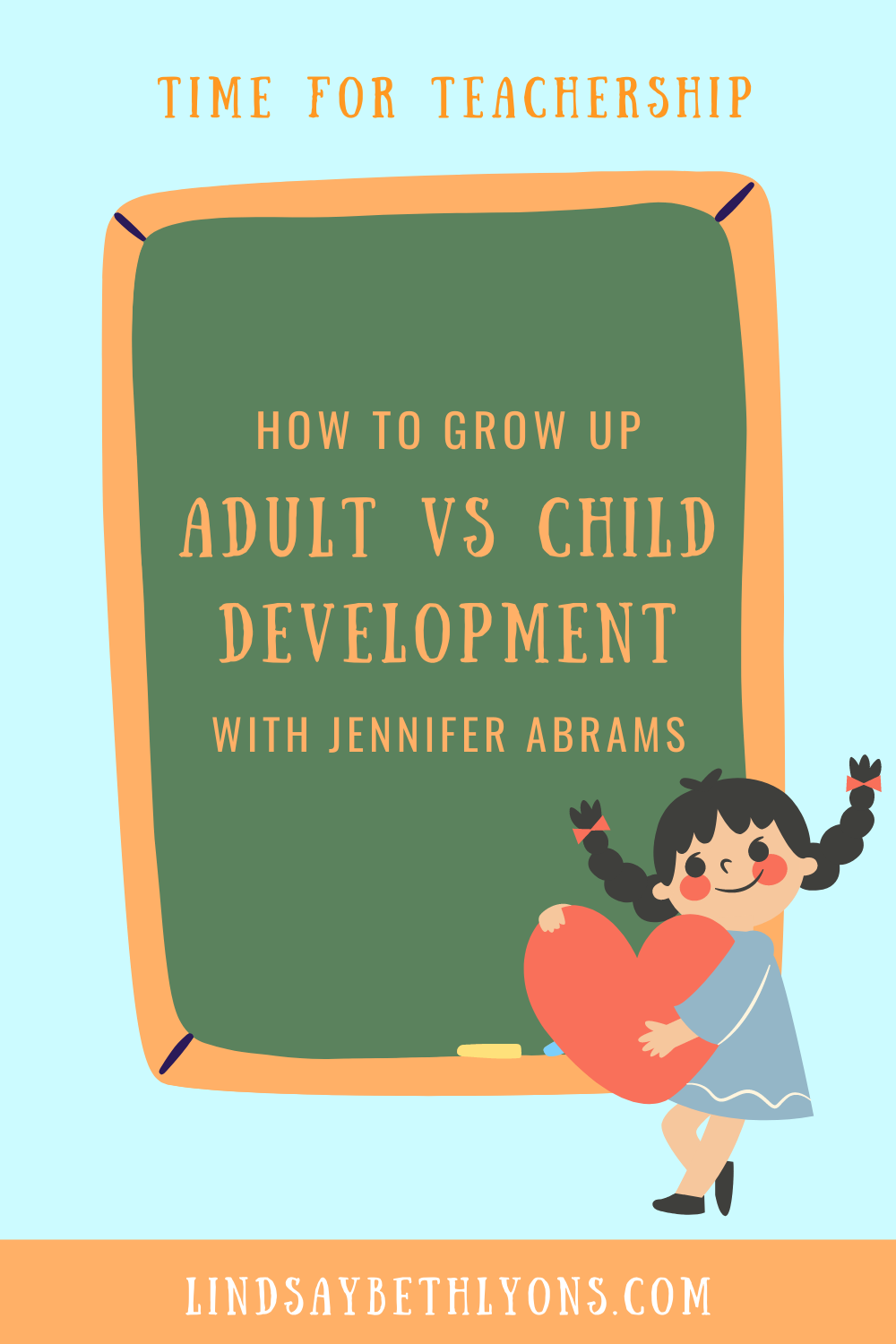
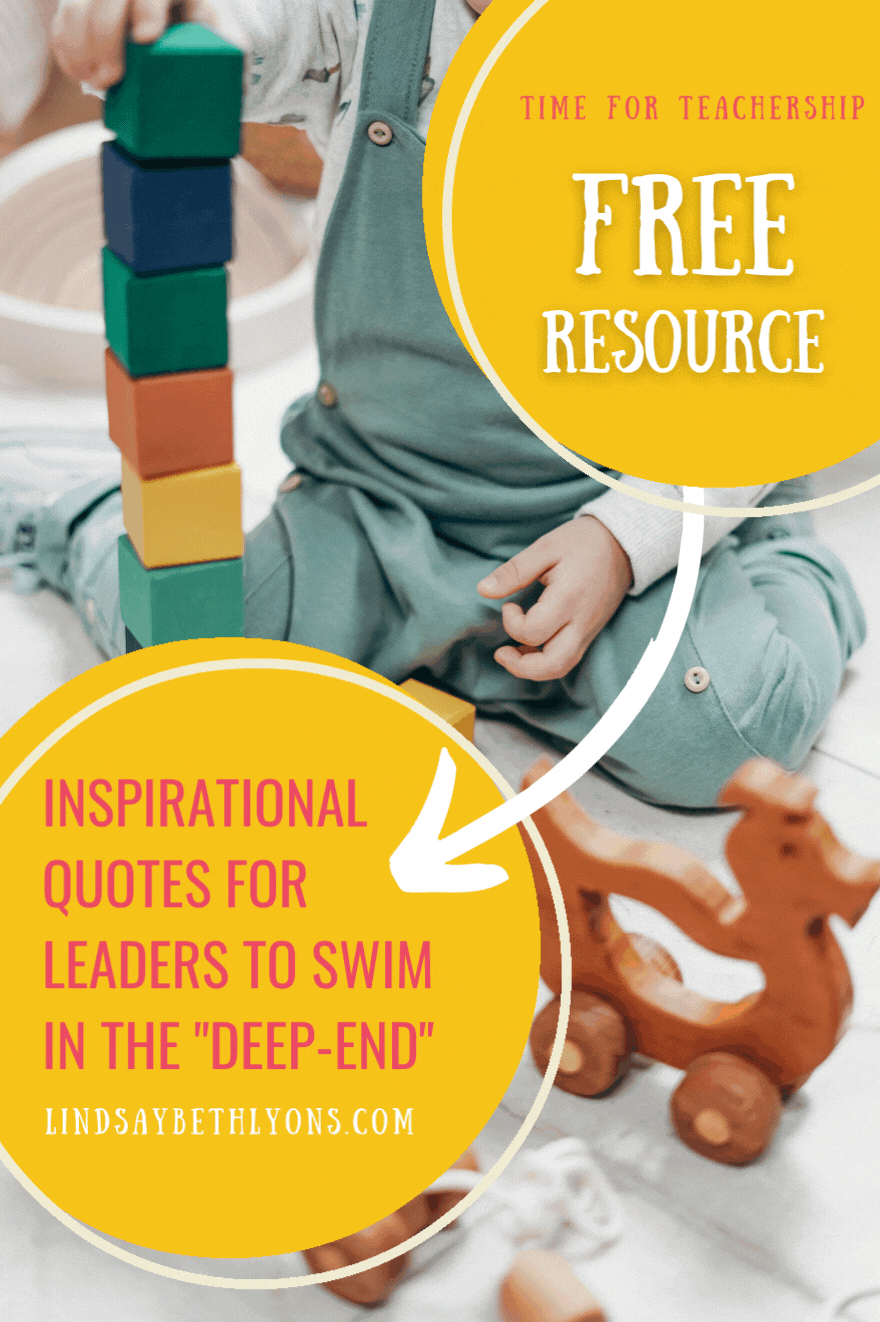
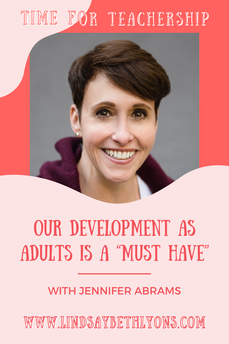

 RSS Feed
RSS Feed